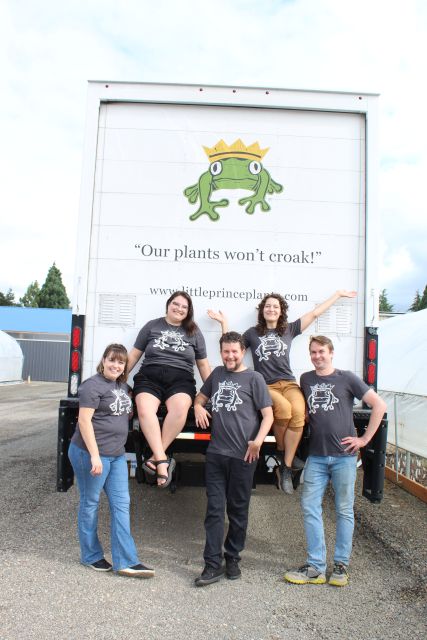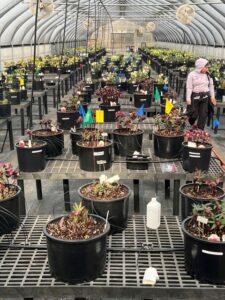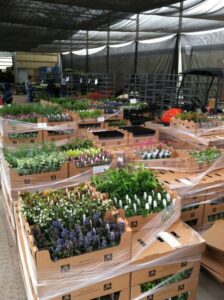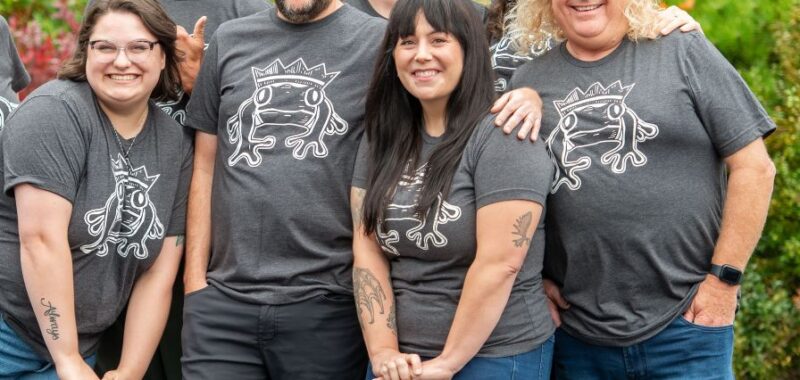
Little Prince’s frog logo is not just a well-recognized emblem for the company. It is also used to highlight niche plant offerings. All photos: Saskia de Kanter
Ketch de Kanter, founder and CEO of Little Prince of Oregon Nursery in Aurora, OR, humbly reveals that the nursery is named after him. While Ketch was growing up, his father said that Ketch’s mother treated him like a “little prince.” Ketch earned the nickname “the little prince of Oregon” as a child. In 1997, Ketch and a friend, Brett Francis, opened the nursery, and Brett had the idea to name it after Ketch. The name, along with its unforgettable frog logo, has become well-known across the horticulture industry.
The operation built a name for itself by offering unique varieties that customers cannot find elsewhere.
“We struggled for the first six years as we were trying to find our way,” de Kanter says. “The nursery industry is pretty daunting when you look at your competition, which is often family-run businesses that have been around for generations. We didn’t know what we were up against. Through marketing and relationships, we navigated the marketplace to find our niche.”
Those efforts paid off when Little Prince of Oregon Nursery was named Greenhouse Grower’s 2024 Operation of the Year at Cultivate’24.
Success Through a Niche Market
Little Prince has developed 14 niche product lines that include unique, hard-to-find varieties. Each product line comes with a quick-witted name, including Lords of the Fly (carnivorous plants), Fit for a King (rare and unusual pants), and FootPrints (groundcovers that tolerate foot traffic). Little Prince caters to garden centers, wholesale growers, landscape designers, and botanical gardens across the U.S..
“They make unique twists on standard things you find in garden centers,” says Alexa Patti, Nursery Manager and Head Grower. “Our logo, the Little Prince frog, means it’s a tried-and-true plant, but it has a new twist. Our niche is that people come to us for things they can’t find elsewhere. They know that we produce good plants, and we do it quickly.”
Some of the plants in high demand at Little Prince include Beesia deltophylla and Bletilla (Chinese ground orchid). Since the nursery is on the smaller side, it is adept at finding smaller breeders with varieties that are hard to come by. Patti says Little Prince has the opportunity to work with innovative breeders, including Terra Nova Nurseries.
Mark Leichty, Director of Business Development for Little Prince of Oregon, says the nursery’s greatest achievement is acquiring the Winter Jewels hellebore series in 2023.
Little Prince of Oregon Nursery was hand-picked by Ernie and Marietta O’Byrne, who carefully grew, selected, and improved the Winter Jewels line of seed-grown hybrid hellebores for more than 30 years.
“Little Prince of Oregon Nursery is honored that Ernie and Marietta deem us worthy to carry on the legacy of the Winter Jewels hellebores,” Leichty says. “We recognize that their diligent and patient work over many decades has created the most beautiful and desirable hellebore hybrids found anywhere in horticulture. We plan to enlarge the program through careful selection and evaluation, providing even more improved varieties for hellebore enthusiasts.”
Winter Jewels hellebores have the following traits:
- Upright stems with gently nodding flowers (to ensure a long-lasting, colorful display and protect the integrity of the breeding line)
- Interesting coloration on the backs of tepals for enjoyment from all angles
- Double flowers with evenly spaced tepals that look beautiful from above
- Fine foliage that complements, rather than overwhelms the flowers
- Deep, saturated, and even color in flowers
The team at Little Prince is thrilled to add Winter Jewels hellebores to its collection.

Little Prince acquired the Winter Jewels hellebore series in 2023 and already has plans to enlarge the program.
Solar Energy, Expansion Are on the Way
A new 14,400-square-foot production building is underway at Little Prince. Leichty expects this structure to be operational in January 2025. Once the new space is available, the existing production area will be repurposed for shipping. Little Prince’s shipping space will almost double, and it will include a new dock and more offices. Solar panels will be installed on the roof of the new production space.
“The solar panels will replace half of our energy usage. We want to be more efficient in every way we can,” de Kanter says. “My goal is to have solar energy run the entire nursery. I think that’s years away, but it’s possible.”
Production Manager Mike Hicks mentions the opportunities for automation in the new production space. Little Prince is working with AdeptAg to take a look at the new facility. The supplier can make recommendations for automation options that would work in Little Prince’s space, such as transplanting machines. Hicks notes that automation often works better for long runs of the same variety, and Little Prince has many varieties in small quantities. The operation trials different types of automation and makes changes when appropriate.
“We’re always looking at efficiency to see if we can save 3-5 seconds on any job,” Hicks says. “If you do that job thousands of times per year, tiny improvements pay off in big numbers by the end of the year.”
He also notes the significant impact that new overtime laws in Oregon have on labor and automation. Little Prince encourages its team members to take days off work when necessary, so it is expected that a couple of people will be gone on any given day. To fill in any gaps, de Kanter says there are always a few additional employees on hand. Before the new overtime laws were passed, farm workers were receiving standard pay for overtime hours. Little Prince, along with many other nurseries, cannot afford to pay time and a half, so the employees will not work overtime hours.
De Kanter notes that employees were taking home more cash before the overtime laws were passed. Little Prince offsets the difference with temporary labor and automation.
“Efficiency for every task at the operation is a pretty big thing to grasp. We’re taking it one step at a time. A year and a half ago, if we could see how much improvement we would make, it would have been overwhelming,” de Kanter says. “Each change becomes a platform that allows you to go on to the next more challenging task. Pick the low-hanging fruit first.”
The next task for Little Prince to tackle is the pulling system for plants and how the greenhouses are numbered. This isn’t exactly automation, but making the pulling system more efficient will reduce man-hours and expenses. As with any change, some resistance and turbulence are expected. However, once staff members see how much more efficient Little Prince could be with a new pulling system, they will be on board.
 Work-Life Balance
Work-Life Balance
In recent years, more companies have touted the phrase “work-life balance,” but sometimes it is easier said than done. This is not the case with Little Prince — they talk the talk and walk the walk. The team knows that work is important, but employees’ families and personal lives are more important.
“Ketch wants people to call out for a mental health day or stay home to take care of their sick child. People don’t need a reason to miss work,” Patti says. “We want to support their life outside of here. We take care of our team, and they take care of us. A lot of companies manage employees’ time off strictly. To me, it doesn’t matter if someone is 15 minutes late. Work-life balance is encouraged here.”
“And we still get the job done,” Hicks adds.
The key to implementing this type of company culture is cross-training. Each team member is trained for multiple responsibilities, such as growing and irrigation.
“Without cross-training, you rely too heavily on someone who doesn’t have a backup in place,” de Kanter says.
The employees also contribute to the company culture because they love Little Prince and its products. Many employees were fans of the company before they joined the team. Patti and Office Manager Zen Landis say they were wooed by one of Little Prince’s booths at the Farwest Show prior to joining the company. Little Prince also has a themed booth at Cultivate. Leichty recalls Little Prince’s Highway to Hellebores booth theme at Cultivate one year, and he dressed up as Angus Young of AC/DC.
“Because of that showmanship aspect, there have been times in my mind when it feels like we’re a band. We have attracted a lot of fans because of our displays at Farwest,” Leichty says. “Ketch talked about the difficulties of getting a nursery established. I did that too before I worked here. It reminds me of another AC/DC song — ‘It’s a long way to the top if you want to rock and roll.’ I’m not saying we’re not at the top, but we’re on a journey. I don’t know where it’s going to take us, but we’re in a good place right now.”
Planning for the Future
“Ten years ago, I realized that I needed to get the company to a place where it can survive without me in the day-to-day operations,” de Kanter says. “The team members make their own decisions. They come to me if there’s a bigger issue. This autonomy makes for a more rewarding experience in the workplace.”
Little Prince has built a strong reputation in the industry, so when there are openings, they are filled quickly. Horticulture professionals, especially young people, value the work-life balance at the operation.
“The next generation has a ‘work to live’ not ‘live to work’ mentality,” Patti says.
Her growing team says their job at Little Prince is engaging and provides them with autonomy. Some companies just want employees to complete a task, while Little Prince encourages ideas and open communication among everyone, ranging from irrigators to management.
“Everyone’s opinion is important. That is what engages and retains employees,” Patti says. “People appreciate feeling valued. Everyone is just as important as everyone else.”
Landis notes the benefits of Little Prince’s mentoring program. Recent graduates at Little Prince know that they love plants, but the mentoring program gives them professional development tools. Patti takes new staff members under her wing and trains them. She shows them how their work in the growing department affects other departments.
“I show them how it affects shipping if we don’t prune something correctly,” Patti says. “I want them to see how we are all gears in a machine.”
Patti also gets to know the young people as individuals and learns about their goals, so she can tailor their role at Little Prince to their personal interests. There are also educational classes available to young team members. Spanish-speakers take English classes and English-speakers take Spanish classes.
“It’s a two-way street,” Patti says.
Saying “Yes”
When asked about his keys to success, de Kanter reflected on an article he read 10 years ago in which a billionaire CEO was interviewed about his success. In the article, the CEO said that whenever anyone asks him for help, as long as that help is not financial, he will provide that help.
“We at Little Prince say yes to each other. That is the internal customer care that we’re doing,” de Kanter says. “We say yes to our customers. We say yes to our vendors. We say yes to our competitors when they want to see what we’re doing here. To me, that’s why we are where we are. We’re not just about ourselves. We’re about improving the industry as a whole.”
0
1
5
Up Close With Little Prince of Oregon Nursery, the 2024 Operation of the Year

